Stock Market Losing Traction on Lack of Fundamentals
Stock-Markets / Financial Markets 2009 Dec 05, 2009 - 04:31 AM GMT The employment situation suggests an improvement - The unemployment rate edged down to 10.0 percent in November, and nonfarm payroll employment was essentially unchanged (-11,000), the U.S. Bureau of Labor Statistics reported today. In the prior 3 months, payroll job losses had averaged 135,000 a month. In November, employment fell in construction, manufacturing, and information, while temporary help services and health care added jobs.
The employment situation suggests an improvement - The unemployment rate edged down to 10.0 percent in November, and nonfarm payroll employment was essentially unchanged (-11,000), the U.S. Bureau of Labor Statistics reported today. In the prior 3 months, payroll job losses had averaged 135,000 a month. In November, employment fell in construction, manufacturing, and information, while temporary help services and health care added jobs.
The CES Birth/Death Model added 30,000 “fictitious” jobs to the statistics in November. So far, this device has added 1,179,000 hypothetical jobs to the workforce since January. The BLS is the most politicized agency in existence, so it is not surprising to see the numbers improving over the Holiday Season. In January there may be a very large statistical “dump” as the BLS adjusts the numbers closer to reality.
There are bloggers who analyze the data and tell us how statistics can be used to hide or augment important data. You may wish to check in on what Mish has to say.
Ben Bernanke gets an earful at his Senate confirmation hearing.
-Alan Greenspan refused to look for bubbles or to do anything other than create them. Likewise it is clear from your statements over the last four years that you failed to spot the housing bubble despite many warnings.
-Under your watch every one of the major banks failed or would have failed had you not bailed them out.
-After taking over the Fed you did not see any need for more substantial regulation of derivatives until it was clear that they were headed into the financial meltdown thanks in part to those products. (Click here to read or view the full transcript!)
The market is losing traction on the lack of fundamentals.
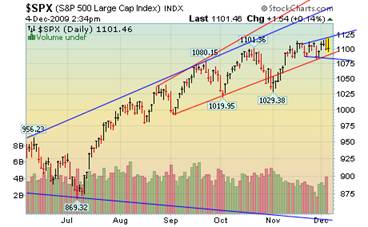 -- Stocks struggled to hang onto gains Friday as surprisingly strong jobs data boosted the dollar, hurting industrial commodities and shares of raw-materials producers. Broad measures of the market posted solid gains in the morning but recently hovered just above the flatline. It also underscored the importance of a dynamic in the rally that has recently driven the market to annual highs, with traders often increasing or decreasing their exposure to stocks based primarily on the cost of money rather than the economy's fundamentals.
-- Stocks struggled to hang onto gains Friday as surprisingly strong jobs data boosted the dollar, hurting industrial commodities and shares of raw-materials producers. Broad measures of the market posted solid gains in the morning but recently hovered just above the flatline. It also underscored the importance of a dynamic in the rally that has recently driven the market to annual highs, with traders often increasing or decreasing their exposure to stocks based primarily on the cost of money rather than the economy's fundamentals.
Treasury bonds don’t like the “good news,” either.
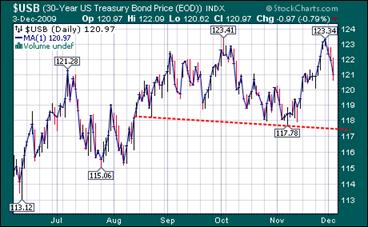 -- Treasury prices dropped even more on Friday, pushing 2-year yields up by the most since July, after the Labor Department said the economy lost 11,000 jobs in November, far less than economists predicted and feeding expectations that the U.S. economy is on the mend. The bond vigilantes don’t like the idea of a recovery, since it also suggests more inflation, which eroded bond values. Therefore, bond prices drop to increase the yield, compensating for higher inflation.
-- Treasury prices dropped even more on Friday, pushing 2-year yields up by the most since July, after the Labor Department said the economy lost 11,000 jobs in November, far less than economists predicted and feeding expectations that the U.S. economy is on the mend. The bond vigilantes don’t like the idea of a recovery, since it also suggests more inflation, which eroded bond values. Therefore, bond prices drop to increase the yield, compensating for higher inflation.
Gold sells off today.
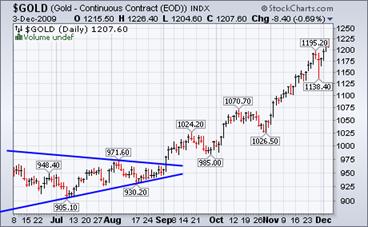 -- Gold fell for the first time this week (not shown in chart), heading for the biggest drop in a year, as a rising dollar spurred some investors to sell bullion on the heels of a rally to a record.
-- Gold fell for the first time this week (not shown in chart), heading for the biggest drop in a year, as a rising dollar spurred some investors to sell bullion on the heels of a rally to a record.
“So many people have piled into gold, so this pop in the dollar is freaking people out,” said Matt Zeman, a metals trader at LaSalle Futures Group Inc. in Chicago. “The dollar is rocking and gold is getting its teeth kicked in.”
The Japanese market cannot sustain this rally.
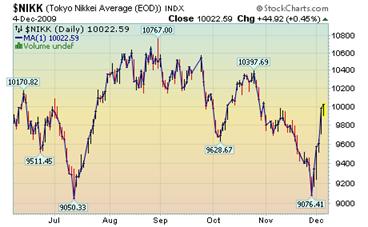 -- Most Japanese stocks fell, as an unexpected contraction in U.S. service industries raised concern the economic recovery is fragile. Japan’s main equity benchmarks both climbed every day this week, swelling the average price of companies in the Topix to 37 times estimated earnings, compared with 17 times for the Standard & Poor’s 500 Index in the U.S. and 16 times for the Dow Jones Stoxx 600 Index in Europe.
-- Most Japanese stocks fell, as an unexpected contraction in U.S. service industries raised concern the economic recovery is fragile. Japan’s main equity benchmarks both climbed every day this week, swelling the average price of companies in the Topix to 37 times estimated earnings, compared with 17 times for the Standard & Poor’s 500 Index in the U.S. and 16 times for the Dow Jones Stoxx 600 Index in Europe.
The Shanghai index recovers prior losses.
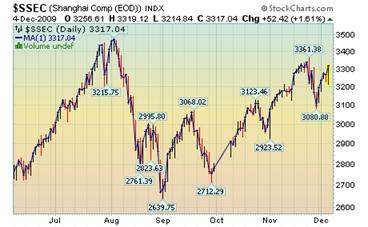 -- The Shanghai Composite Index gained 52.42, or 1.6 percent, to 3,317.04 at the close, while more than three stocks retreated for each that rose. The gauge rallied 7.1 percent this week, erasing last week’s 6.4 percent slump that was sparked by concern lenders will sell shares to replenish capital. The market has been plagued by banks selling stocks to raise cash, which dilutes existing investor capital. Investors are also cautious about the direction of government policy on the economy, which might pull the rug out from the recovery.
-- The Shanghai Composite Index gained 52.42, or 1.6 percent, to 3,317.04 at the close, while more than three stocks retreated for each that rose. The gauge rallied 7.1 percent this week, erasing last week’s 6.4 percent slump that was sparked by concern lenders will sell shares to replenish capital. The market has been plagued by banks selling stocks to raise cash, which dilutes existing investor capital. Investors are also cautious about the direction of government policy on the economy, which might pull the rug out from the recovery.
The dollar rises from the bottom.
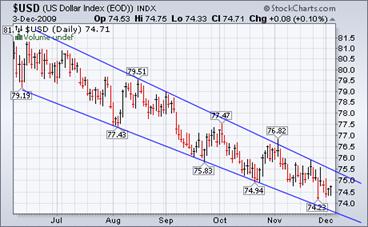 The dollar rose the most since June against the currencies of major U.S. trading partners as the payrolls report encouraged traders to boost bets on Federal Reserve rate increases.
The dollar rose the most since June against the currencies of major U.S. trading partners as the payrolls report encouraged traders to boost bets on Federal Reserve rate increases.
The gauge has fallen about 19 percent from a three-year high reached in March, dropping on speculation that the Fed would be slow in raising borrowing costs.
Futures on the Chicago Board of Trade showed a 53 percent chance that the Fed will raise the target lending rate by at least a quarter-percentage point by the June meeting, up from 43 percent yesterday. A week ago the likelihood was 31 percent.
The Housing Crash is not over.
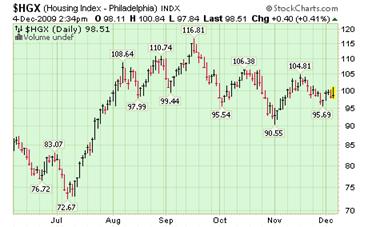 -- Mark Zandi, chief economist at Moody's Economy.com in West Chester, Pennsylvania, said in an interview with Reuter’s home prices will resume their decline by early next year as foreclosure sales pick up again. "The housing crash is not over," he said. The U.S. housing market has suffered the worst downturn since the Great Depression, and its impact has rippled through the recession-hit economy as well as the rest of the world.
-- Mark Zandi, chief economist at Moody's Economy.com in West Chester, Pennsylvania, said in an interview with Reuter’s home prices will resume their decline by early next year as foreclosure sales pick up again. "The housing crash is not over," he said. The U.S. housing market has suffered the worst downturn since the Great Depression, and its impact has rippled through the recession-hit economy as well as the rest of the world.
Refinery capacity has grown.
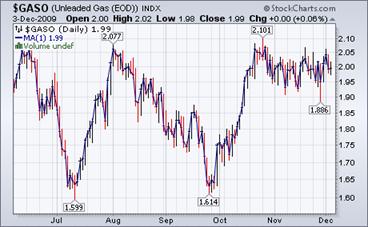 The Energy Information Agency weekly report suggests, “No major new refineries have been built in the United States since the 1970s, but that does not mean that U.S. refinery capacity has not grown. Refiners can increase capacity at existing sites by modifying equipment to increase product flow and by adding new distillation units. Consequently, total U.S. refining capacity increased by 14 percent, with the average annual capacity increase of about 185 thousand barrels per day (Mbbl/d) over this period, equivalent to adding one and a half average-sized refineries each year.”
The Energy Information Agency weekly report suggests, “No major new refineries have been built in the United States since the 1970s, but that does not mean that U.S. refinery capacity has not grown. Refiners can increase capacity at existing sites by modifying equipment to increase product flow and by adding new distillation units. Consequently, total U.S. refining capacity increased by 14 percent, with the average annual capacity increase of about 185 thousand barrels per day (Mbbl/d) over this period, equivalent to adding one and a half average-sized refineries each year.”
Higher NatGas prices not showing in the futures market.
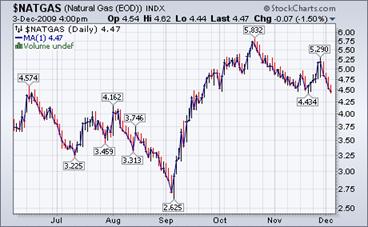 The Energy Information Agency’s Natural Gas Weekly Update reports, “Price decreases leading up to Thanksgiving reflected the usual decrease in demand that generally occurs during a holiday week. A decrease in industrial demand and milder-than-normal temperatures in some areas of the country also drove price declines. According to Bentek Energy, LLC, total U.S. demand dipped during the Thanksgiving holiday and demand in all regions was lower than the week prior. Demand for natural gas has been slow to recover, although the onset of colder weather may spur some space-heating demand in the coming days.”
The Energy Information Agency’s Natural Gas Weekly Update reports, “Price decreases leading up to Thanksgiving reflected the usual decrease in demand that generally occurs during a holiday week. A decrease in industrial demand and milder-than-normal temperatures in some areas of the country also drove price declines. According to Bentek Energy, LLC, total U.S. demand dipped during the Thanksgiving holiday and demand in all regions was lower than the week prior. Demand for natural gas has been slow to recover, although the onset of colder weather may spur some space-heating demand in the coming days.”
A link between TB and austerity measures from the IMF?
The Ukraine Government has declared a state of emergency and medical examiners describe results of autopsies on dead patients in chilling terms that recall the Black Death descriptions from the Fourteenth Century in Venice. While everyone is calling it “Swine Flu” and the WHO using it to spread their panic and untested vaccines, there is strong evidence that the deaths—almost all from pulmonary conditions—are from a rising incidence of Tuberculosis (TB). Now a Cambridge University study shows that there is a close correlation between rise in TB and the severe austerity measures that go with IMF loans. Are the Ukraine ‘Black Death’ cases the result of Ukraine’s IMF loans?
This time is not different.
Dr. Ken Rogoff and Carmen Reinhart claim that historic studies of debt driven financial crisis suggests we’ve got a long way to go before many of the global economic problems are resolved. In their new book “This Time Is Different” they note banking crises that are driven by excess debt, like the one we’re in, tend to stick around for years.
On December 4, 1930…
Market wrap: [Note: Major banking crisis is in process of erupting.]Comptroller of the Currency J. Pole says general banking situation hasn't changed much in past year; metropolitan banks generally not a problem, but country banks having a difficult time in some cases.
Our Investment Advisor Registration is on the Web
We are in the process of updating our website at www.thepracticalinvestor.com to have more information on our services. Log on and click on Advisor Registration to get more details.
If you are a client or wish to become one, please make an appointment to discuss our investment strategies by calling Connie or Tony at (517) 699-1554, ext 10 or 11. Or e-mail us at tpi@thepracticalinvestor.com .
Anthony M. Cherniawski,
President and CIO
http://www.thepracticalinvestor.com
As a State Registered Investment Advisor, The Practical Investor (TPI) manages private client investment portfolios using a proprietary investment strategy created by Chief Investment Officer Tony Cherniawski. Throughout 2000-01, when many investors felt the pain of double digit market losses, TPI successfully navigated the choppy investment waters, creating a profit for our private investment clients. With a focus on preserving assets and capitalizing on opportunities, TPI clients benefited greatly from the TPI strategies, allowing them to stay on track with their life goals
Disclaimer: The content in this article is written for educational and informational purposes only. There is no offer or recommendation to buy or sell any security and no information contained here should be interpreted or construed as investment advice. Do you own due diligence as the information in this article is the opinion of Anthony M. Cherniawski and subject to change without notice.
Anthony M. Cherniawski Archive |
© 2005-2022 http://www.MarketOracle.co.uk - The Market Oracle is a FREE Daily Financial Markets Analysis & Forecasting online publication.



